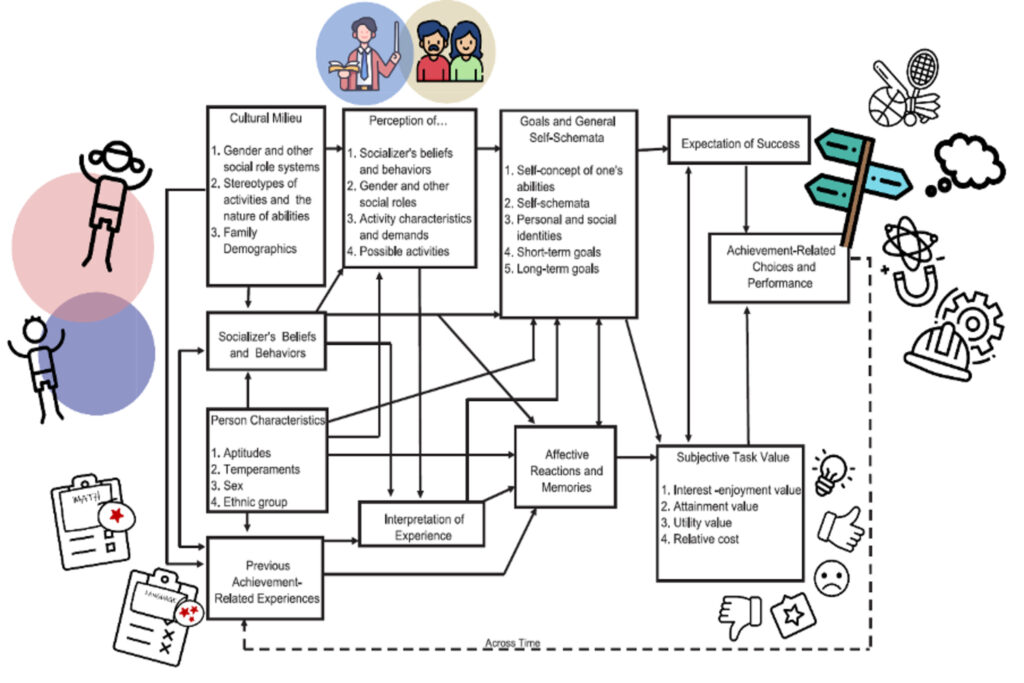A visualization of the SEVT framework, taken from Eccles and Wigfield (2020).
Can the theoretical framework that I have been using in my research help me think more wisely about my next career step?
I really like the Situated Expectancy Value Theory (SEVT for short) by Jacque Eccles and colleagues because this framework seems to explicitly consider not only individual’s personal characteristics, but also the complexity of other sources of information in shaping choices and decisions – which had been helpful for my work in exploring gendered pathways of students. As I have been reading and pondering extensively over the past two (almost three) years on the Expectancy Value Theory to guide my research, I realized I could perhaps use it to reflect on my own career options too.
What does the theory describe?
In this framework, people’s decisions and actions are described as a result of (1) their success expectancy and (2) subjective task values. First, the “expectancy part” talks about how the more you believe that you’ll succeed in a certain task or field, the more likely you’ll engage in it. The other part, the “task value”, describes how the more you find a field/task interesting, important for your identity, useful for your future endeavor/goals… the more likely you’ll engage in this task. On the opposite side, the more you find this field or task as taxing and/or costly, the more likely you’ll abandon it and switch to something else.
But not just stopping there, this framework also explains that these beliefs develop under the influence of SO MANY OTHER different contextual factors: one’s personal characteristics (e.g., age, personality, gender), socializers’ beliefs, past experiences (e.g., experience of success/failure, opportunities coming/going), which gives room to describe how different people, with different backgrounds, would end up having such different interests, set of identity, and finally, decisions.
Reflecting on the journey
Now the best theories are those that do not only describe but also are able to predict. This framework has been holding up pretty well in research, so why not utilize it as a tool to think about how to move forward? (Please note that I am not trying to “predict” your career course, nor mine, for that matter! But how about using it to structure our thinking on how to make decisions?)
The framework highlights how we can come to afford certain beliefs: there is the right support (be it personally, in social terms: supportive parents, friends, partners, in practical terms: financial stability, supportive organizational culture; or more on the macro-level: governmental structures, policies) alongside enough positive experience (personal successes, acknowledgements and positive feedback, open doors/opportunities, personal fascination and satisfaction).
With the “right” set of factors, there is more likelihood of finding ourselves considering a certain trajectory more than the other.
Take an example of considering continuing in academia: I would say I am more likely to continue in academia with a low-paying position (which seems to be the rule and not the exception), if (1) I have a (cumulative) positive experience in performing well in academia (e.g., publishing in top journals, winning awards and grants), and (2) I find the topic/field that I’m working on extremely exciting, it aligns to my personal/group identity, aligns to my personal goal, and is acceptably taxing – not too excessively.
This would have also been more likely from the following background conditions: I have either (1) a family/partner whose income is reliable so that I can continue in my low-paying position, (2) I am lucky enough to have been exposed to the right opportunities for funding and publications, showing me to leverage the hope to continue it, (3) my community/culture appreciates my endeavor and values it highly, (4) I have great mentors who helped me along the way, … and the list goes on.
Here’s my favorite part: there is, to some extent, the embedded idea of “agency”: these values are not only decided from a mix of outside and inside factors of an individual. Although not all of the “outside” factors are up to us, the “inside” ones are the ones that matter most, eventually. So whether we prioritize our interest in a specific topic or the community goal that we identify with — these are up to us. They could be in opposition to each other, and that’s life, but we get to decide how the hierarchy looks.
What I take from this extensive mental exercise is this: we come with our own set of affordances; and as much as the world loves the idea of “just go do what you love” and that “anyone can be whoever they want to be” we all know that there are limitations. We come to a specific set of values and decisions because it’s not always “just our choice”. We have cards that have been dealt for us, and we couldn’t change them all – like where and what kind of family/community we’re born and raised in; what kind of financial situation we grew up in; what set of caretakers and communities we were embedded in; what kind of supervision relationship we ended up having.. and as much as we think a lot of these aspects are something “controllable”, if we’re being honest, not all of them are.
I hope that we get to sit down and truly reflect on not only our social context, but also on what our set of values are – and be honest about our affordances. Life is complex, there is no lying about it. This is one suggestion from me on how we can embrace that reality.
Now, why not share what has helped you? How have you approached your career decision before? Do you think this can be a beneficial tool for you?
Further Readings
Eccles, J. (2009). Who Am I and What Am I Going to Do With My Life? Personal and Collective Identities as Motivators of Action. Educational Psychologist, 44(2), 78–89. https://doi.org/10.1080/00461520902832368
Eccles, J. S., Adler, T. F., Futterman, R., Goff, S. B., Kaczala, C. M., Meece, J. L., & Midgley, C. (1983). Expectancies, values, and academic behavior. In J. T. Spence (Ed.), Achievement and Achievement Motives (pp. 75–138). W. H. Freeman and Company.
Eccles, J. S., & Wigfield, A. (2020). From expectancy-value theory to situated expectancy-value theory: A developmental, social cognitive, and sociocultural perspective on motivation. Contemporary Educational Psychology, 61, 101859. https://doi.org/10.1016/j.cedpsych.2020.101859

Gendered pathways to professional life (Finland)
